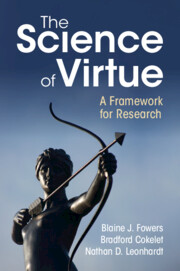Book contents
- The Science of Virtue
- The Science of Virtue
- Copyright page
- Contents
- Acknowledgments
- Introduction
- Part I Philosophical Resources and Prospects
- Part II Psychological Resources and Prospects
- Part III Organizing Virtue Research with the STRIVE-4 Model
- Chapter 7 Virtues as Scalar Traits
- Chapter 8 The Role Sensitivity of Virtues
- Chapter 9 Virtue Trait by Situation Interactions
- Chapter 10 Values and Eudaimonia as Guideposts for Virtues
- Chapter 11 The Four Components of Virtue
- Part IV The Science and Practice of Virtue
- References
- Index
Chapter 10 - Values and Eudaimonia as Guideposts for Virtues
from Part III - Organizing Virtue Research with the STRIVE-4 Model
Published online by Cambridge University Press: 11 January 2024
- The Science of Virtue
- The Science of Virtue
- Copyright page
- Contents
- Acknowledgments
- Introduction
- Part I Philosophical Resources and Prospects
- Part II Psychological Resources and Prospects
- Part III Organizing Virtue Research with the STRIVE-4 Model
- Chapter 7 Virtues as Scalar Traits
- Chapter 8 The Role Sensitivity of Virtues
- Chapter 9 Virtue Trait by Situation Interactions
- Chapter 10 Values and Eudaimonia as Guideposts for Virtues
- Chapter 11 The Four Components of Virtue
- Part IV The Science and Practice of Virtue
- References
- Index
Summary
Some neo-Aristotelians see a strong link between virtues and eudaimonia or flourishing, but others do not. After acknowledging this difference, the chapter explores some of the possible implications of this link. The view explored in this chapter is that virtues contribute to success in goal and good pursuit, which, in turn, contributes to a flourishing life. The neo-Aristotelian view examined holds that there are things that are good for humans qua humans (e.g., close personal relationships, group belonging). Success in pursuing these goods is hypothesized to be correlated with eudaimonia. It explores several challenges in studying eudaimonia, but concludes that eudaimonia research should continue and be updated as conceptualization and measurement improves. The chapter concludes with a discussion of three well-documented human goods (close personal relationships, group belonging, and meaning) and their hypothesized relationships with specific virtues (e.g., loyalty, forgiveness, honesty).
- Type
- Chapter
- Information
- The Science of VirtueA Framework for Research, pp. 242 - 265Publisher: Cambridge University PressPrint publication year: 2024

